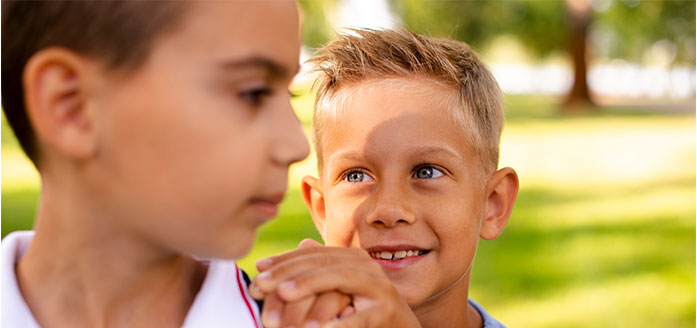Have you ever wondered what kind of friends your kid brother or sister would have that they might have in the future? What if their friends were not only the people they grew up with, but also the kids they went to school with in college?
What was your ideal childhood relationship with your sibling, or with other children?
My ideal childhood relationship with my sibling was that we were always on the same page, and could talk about anything. I would also hope that my kid brother or sister would have similar relationships with their friends.
I was also raised in a household where it wasn’t common for parents to be around during the evening, but my dad would always be home by 8pm and on average, he would leave at midnight or 1am. It was the same with my mom.I would hope that my kid brother or sister will have that same routine.My ideal childhood relationship with other kids is that I want people to be nice to them, and see them as friends. I never had any problems being friends with other kids as an adult. How many siblings do you have? What were/are their names? Do they live close by? How often do you see your siblings? Have you ever lived apart from them? Has there been sibling rivalry between your siblings?
Some qualities that may make friends for your sibling
Some qualities that may make friends for your sibling include being able to be open minded, supportive, and honest. It is important that your brother or sister have good communication skills as these are key ingredients to forming friendships. Additionally, siblings may share common interests which can help form relationships. Finally, it is important that siblings enjoy spending time together as this will encourage them to keep in touch.
What do you hope for the future of the relationship between you and your brother or sister?
It can be difficult to predict what sort of friends our kids will have in adulthood, but we can hope for the best. Kids need close relationships with their brothers and sisters, and it’s important for them to establish these early in life. If siblings can get along well, they’re more likely to stay connected as adults. Here are a few things to keep in mind when building a healthy relationship with your brother or sister:
- Respect each other’s opinions and feelings. It’s okay to have different views, but try not to argue about them. Just respect each other’s position and agree to disagree respectfully.
- Be supportive of one another. Encourage one another in your hobbies and interests, and offer moral support when needed. Let your sibling know you’re there for them, no matter what happens.
- Be mindful of your words and actions when around one another. Don’t make jokes that hurt or criticize unnecessarily. Simply stating your opinion is usually enough without being disrespectful or mean spirited.
Have these friends always been there, where did they come from?
If you were to ask most kids their opinion on who they would hope their kid brother or sister would have in their life, the answer would likely be people they know from around town. But what if those people are not always there for your child when he or she needs them? What if your child doesn’t have any other close friends? In these situations, it can be helpful to look to family members and friends from before your child was born for support.
Teach Your Siblings the Importance of Right Friendship
When it comes to building strong relationships, it can be helpful to think about what sort of friends your child brother or sister would want. Having the right type of friend can be beneficial for your sibling’s development, both emotionally and socially. Here are a few key points to keep in mind when selecting friends for your kids:
First, choose friends that will help your child build positive character traits. Kids need role models, and their friends should be people who exhibit qualities you want them to emulate. Consider picking friends who are honest, kind, and compassionate.
Second, make sure your siblings have enough time for fun and relaxation. Too much pressure to fit in can lead to negative friendships. It’s important for kids to have healthy social interactions that don’t come at the cost of their free time.
Finally, be sure to set limits on how much screen time your children spend with their buddies. Too much electronic media can also have negative effects on friendships. It’s important to find a balance that works best for your family.
What Expectations Can You Keep?
If you’ve ever been around siblings, then you know that they can be a lot of fun. But, what happens when one or both of them grow up and become different people? Will your relationship still be the same? In this blog, we will be discussing what sort of friends your kid brother or sister should have.
When it comes to friendships, it is important to have expectations. If you think your brother or sister is going to just be like always and hang out with you all the time, then you might be disappointed. However, if you understand that they may have their own lives now and don’t always have time for you, then you can still be friends. Just make sure that your friendship is still enjoyable for both of you.
There are a few things that you can do in order to make sure that your relationship stays strong with your brothers and sisters as they grow up. First and foremost, try to spend time together as often as possible. This doesn’t mean that you have to get along perfectly- in fact, sometimes disagreements are healthy. But, try to have conversations and interactions that don’t revolve around their careers or studies.
Conclusion
What sort of friends would you hope your kid brother or sister would have? Well, ideally they’d be supportive, kind-hearted individuals who are always there for a chat and a laugh. But if they happen to be jerks, that’s okay too — as long as you can stand up to them when necessary and maintain healthy relationships with both your siblings. What sort of friends do you hope your kids will have?
Frequently Asked Questions
What to teach your younger siblings about friendship?
It’s always a good idea to teach your younger siblings about friendship. You can start by explaining the basics, such as why it’s important to have friends, what makes a good friend, and how to be a good friend. You can also help them understand the importance of sharing and being understanding. It’s also important to teach them how to handle difficult situations and how to stand up for themselves. Finally, you should encourage them to be active members of their community and learn more about different cultures.
Importance of the right knowledge of friendship during your early childhood?
It is important to have the right knowledge of friendship during your early childhood. This will help you to form healthy and lasting friendships. You should not focus too much on relationships that are based on physical attraction. Instead, develop relationships with people who share similar interests and values. This will help you to build a strong foundation for your future friendships.
Read Also:
Does It Make You Feel Good To Be A Kind Friend? Why?
What Is Something That Can Be Difficult In A Friendship
6 Best Fun And Friendship Quizzes
Important Value Of The First Friend Which We Have
Soothing Gestures That Friend Will Bring You


 Uncategorized3 years ago
Uncategorized3 years ago
 Entertainment12 months ago
Entertainment12 months ago
 Uncategorized3 years ago
Uncategorized3 years ago
 Uncategorized3 years ago
Uncategorized3 years ago
 Uncategorized3 years ago
Uncategorized3 years ago
 Uncategorized3 years ago
Uncategorized3 years ago
 Uncategorized3 years ago
Uncategorized3 years ago
 Uncategorized3 years ago
Uncategorized3 years ago
